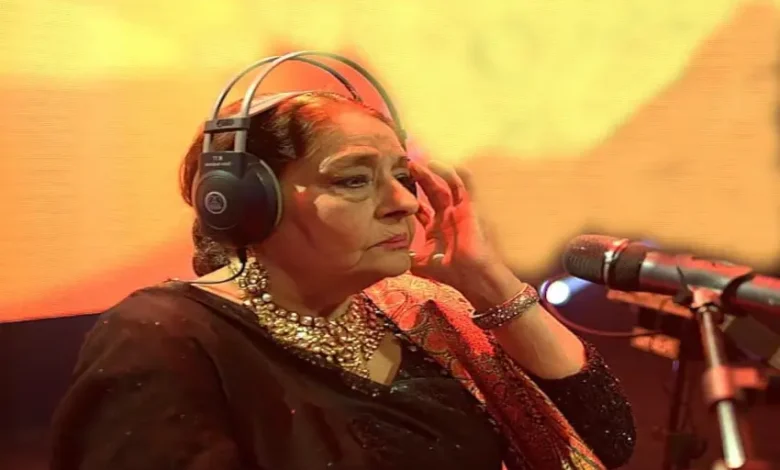
Farida Khanum – Bio, Top 20 Best Pakistani Ghazals Music
Farida Khanum is popular Pakistani Ghazal music artist. When we speak about the captivating global of Ghazals, one name that stands proud is Farida Khanum. Often referred to as the Queen of Ghazals, Farida Khanum’s melodious voice and profound expressions have left an indelible mark on South Asian music. Her contributions now not only highlight the beauty of Ghazals but additionally underscore their cultural importance within the vicinity.
Table of Contents
ToggleBest Farida Khanum Ghazals Music Download
Biography and Early Life of Farida Khanum
Farida Khanum was born in Calcutta in 1929 at a time when the Indian subcontinent was culturally vibrant and diverse. Her formative years were absorbed in the rich musical traditions that surrounded him. In 1947, amid partition riots, her family migrated to Pakistan. The move was a pivotal moment in her career, paving the way for her illustrious career in the world of Ghazal.
The beginning of her musical career
Farida Khanum’s musical journey began at an early age. She first appeared on Radio Pakistan when she was just 13 years old. Despite the challenges of starting a career at such a young age, her talent shone through, captivating audiences with her unique voice and emotional depth.
Rise and make a name for herself
In 1950, Farida Khanum gave her first public concert, which made her famous. Her popularity peaked in the 1960s and 1970s, during which time she became a household name in Pakistan. Her performance was eagerly awaited and she soon became synonymous with ghazals.
Ghazal Music and its Cultural Influence
Derived from genuine Arabic poetry, ghazals are known for their deep emotional resonance. Themes such as love, loss, and longing are often explored, making them a powerful medium for the expression of the human experience. The ghazal, a form of poetry in rhymed dahi, has become a musical staple in South Asia, with Farida Khanum at the forefront.
Farida Khanum’s Contribution to Ghazal Music
Farida Khanum’s contribution to ghazal music is unparalleled. Her signature style, characterized by a perfect blend of classical rigor and emotional detail, has set a standard for other artists. Her voice is soulful and powerful and capable of conveying the deepest emotions, and her language is timeless.
Wonderful performance
Among her many musical memories, Farida Khanum’s concerts in India and Kabul stand out. Her performance in India was particularly well received, bridging the cultural divide and demonstrating the universal appeal of Ghazal. In Kabul, in the 1960s and early 1970s, she worked with local musicians, singing Persian ghazals and creating beautiful cultural hybrids.
Acceptance and Awards
Farida Khanum’s exceptional talents and contributions have been recognized with several prestigious awards. In 1970, she was awarded the Pride of Performance Award by the President of Pakistan. Later, in 2005, she received the Hilal-i-Imtiaz Award, one of Pakistan’s highest civilian honors.
Personal Life
Apart from her professional achievements, Farida Khanum’s personal life is equally interesting. She lives in Lahore and is the proud mother of one son and five daughters. Her family, including her sister Sheeba Hassan, who is famous for her role as Sona Chandi in PTV dramas, has also joined the artistic tradition.
Legacy and Influence
Farida Khanum’s legacy extends beyond her acting. She mentored many young artists and influenced countless other artists. Her influence on Pakistan’s musical culture is profound, and many contemporary ghazal singers draw inspiration from her work.
Popular Ghazals by Farida Khanum
Some of Farida Khanum’s favorite ghazals are “Aaj Jaane Ki Zid Na Karo”, “Woh Ishq Jo Humse Ruth Gaya”, and “Dil Jalane Ki Baat Karta Ho” These songs don’t seem to reflect her vocal prowess reveals not only her ability to bring poetry to life through music.
Cultural Exchange through Music
Her collaborations with musicians in Afghanistan and her performances in India have contributed to a deeper understanding and appreciation of ghazal music across borders and her music transcends language and cultural barriers and resonates across the globe.
At some point in time
The music world was deeply saddened by the death of Farida Khanum on February 25, 1982. Her death brought an era to an end, but her music still lives on, with fans old and new her work captures the timeless beauty of Ghazal, and the artist involved is interested in any genre It is a reminder of the impact it can have.
Farida Khanum Ghazals Development
Ghazal Pakistani music has been evolving since the days of Farida Khanum. New artists have emerged, bringing their interpretations and styles to the genre. However, the significant influence of Farida Khanum on the career of this modern musician remains evident.
Conclusion
Farida Khanum’s legacy as Ghazal Queen will live on for generations. Her contribution to music, emotional depth, and cultural impact left an indelible mark on the world of Ghazal. Not only does she preserve a rich musical tradition, but she has inspired countless artists to explore and express their musical journeys.
FAQs
1. Who was Farida Khanum?
Farida Khanum was a famous Pakistani ghazal singer, often called the Queen of Ghazal. She was known for her soulful voice and the emotional depth of her music.
2. What are some of the famous ghazals of Farida Khanum?
Her famous ghazals include “Aaj Jane Ki Jid Na Karo”, “Woh Ishq Jo Humse Ruth Gaya”, and “Dil Jalane Ki Baat Karte Ho”.
3. What awards has Farida Khanum won?
Farida Khanum received the Pride of Performance Award in 1970 and the Hilal-i-Imtiaz Award in 2005.
4. How did Farida Khanum contribute to ghazal music?
With her unique style, powerful voice, and emotional expression, she popularized ghazal music, leaving a lasting legacy that influenced many contemporary artists
5. What is the cultural significance of ghazals?
Ghazal is a form of poetry that explores the themes of love, loss, and longing and resonates deeply with the audience. They have a rich history in South Asian culture and remain important musical instruments.





Somebody essentially lend a hand to make significantly posts I might state That is the very first time I frequented your web page and up to now I surprised with the research you made to create this particular put up amazing Excellent job